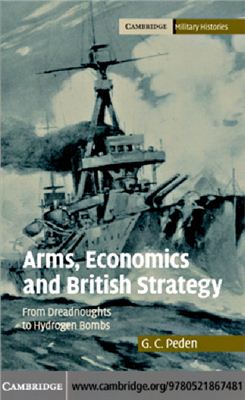Cambridge: Cambridge University Press, 2007. - 398p.
Review
"This is a first-rate book by a first-rate scholar.It is intellectually sophisticated, clearly written, and its conclusions follow nicely from the evidence marshalled in each chapter.this is a book that all students of the period must read."
Keith Neilson, The Inteational History Review
".this is a rich, profound, sometimes difficult work of historical scholarship that deserves to make a lasting impact in its field."
EH.NET
"Arms, Economics and British Strategy is an outstanding book that will become central to our understanding of British military policy in the twentieth century." -Simon Ball, Diplomacy and Statecraft
Product Description
This book integrates strategy, technology and economics and presents a new way of looking at twentieth-century military history and Britain's decline as a great power. G. C. Peden explores how from the Edwardian era to the 1960s warfare was transformed by a series of innovations, including dreadnoughts, submarines, aircraft, tanks, radar, nuclear weapons and guided missiles. He shows that the cost of these new weapons tended to rise more quickly than national income and argues that strategy had to be adapted to take account of both the increased potency of new weapons and the economy's diminishing ability to sustain armed forces of a given size. Prior to the development of nuclear weapons, British strategy was based on an ability to wear down an enemy through blockade, attrition (in the First World War) and strategic bombing (in the Second), and therefore power rested as much on economic strength as on armaments.
Review
"This is a first-rate book by a first-rate scholar.It is intellectually sophisticated, clearly written, and its conclusions follow nicely from the evidence marshalled in each chapter.this is a book that all students of the period must read."
Keith Neilson, The Inteational History Review
".this is a rich, profound, sometimes difficult work of historical scholarship that deserves to make a lasting impact in its field."
EH.NET
"Arms, Economics and British Strategy is an outstanding book that will become central to our understanding of British military policy in the twentieth century." -Simon Ball, Diplomacy and Statecraft
Product Description
This book integrates strategy, technology and economics and presents a new way of looking at twentieth-century military history and Britain's decline as a great power. G. C. Peden explores how from the Edwardian era to the 1960s warfare was transformed by a series of innovations, including dreadnoughts, submarines, aircraft, tanks, radar, nuclear weapons and guided missiles. He shows that the cost of these new weapons tended to rise more quickly than national income and argues that strategy had to be adapted to take account of both the increased potency of new weapons and the economy's diminishing ability to sustain armed forces of a given size. Prior to the development of nuclear weapons, British strategy was based on an ability to wear down an enemy through blockade, attrition (in the First World War) and strategic bombing (in the Second), and therefore power rested as much on economic strength as on armaments.

